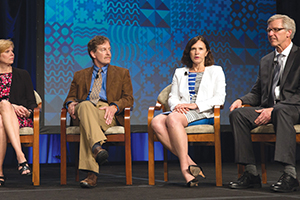By JULIE MINDA
WASHINGTON, D.C. — Ministry systems and facilities are on the leading edge of developing workable solutions to systemic health care delivery challenges. But, frequently, these innovations fail to achieve the broad, sweeping impact they could, because thought leaders do not share their best ideas with others for replication, said Dr. Molly Coye, an innovation expert who highlighted creative approaches from the ministry during a June 8 general session at the Catholic Health Assembly.

Dr. Molly Coye
Photo credit: Evelyn Hockstein/© CHA
To help innovators to share their successful methods with others, in 2014 the University of California, Los Angeles created a Global Lab for Health to collect and spread the most impactful and promising approaches. During the assembly session, Coye shared the results of a challenge the lab issued to CHA members, to submit their best ideas in population health management. Coye, who is chief executive of the Global Lab and "social entrepreneur in residence" for the Network for Excellence in Healthcare Innovation, showcased four standouts from among 21 submissions from the ministry. The Network for Excellence is a nonprofit, nonpartisan health policy institute based in Cambridge, Mass. Coye works out of its San Francisco office.
The first, a coordinated care program from KentuckyOne Health of Louisville, Ky., uses an integrated team to help high users of hospitals better navigate the health system, so they can avoid unnecessary hospital readmissions. The second, a "tele-ICU" program from Dignity Health of San Francisco, has intensivists and other specialists rounding — via telemedicine — with ICU patients several times a day. The effort has reduced costs in part because patients do not have to be transferred to where the specialist is, nor do specialists have to travel between multiple sites. The third, the Pregnancy Care Package from Providence Health & Services of Renton, Wash., provides prenatal education and preparation to expectant moms in a group setting. And the fourth is a program of Milwaukee-based Ministry Health Care that trains advanced practice nurse practitioners to be hospitalists, so they can tend to patients in rural hospitals within Ministry that lack physician coverage.

Describing innovative programs at their hospital or health systems are, from left, Alice Bridges, vice president of healthy communities for KentuckyOne Health's Jewish Hospital & St. Mary's Healthcare in Louisville, Ky.; Jim Roxburgh, director of the telemedicine network for the Dignity Health Greater Sacramento, Calif., service area; Kathy Criswell, executive for the women's and children's program for Providence Health & Services of Renton, Wash.; and Dr. John Almquist, medical director of hospitalist programs for Ministry Health of Milwaukee.
Photo credit: Evelyn Hockstein/© CHA
Coye said the selection committee, made up of ministry leaders, chose these four programs for their novelty, their demonstrated results, their success in solving health care access problems or creating value for the ministry organization, their viability and their scalability through replication. She encouraged Catholic health leaders to learn more about the four ministry programs — as well as other ideas being submitted to the lab — to determine whether the approaches would benefit their organizations. Descriptions of all 21 programs submitted for consideration in the CHA/Global Lab challenge are at globallabforhealth.org, under the "browse" section.
Coye told the audience that health systems should constantly look within and outside their organizations for ideas that have the potential for broad positive impact and that advance the strategic goals of the organization.
She noted, too, that ministry leaders must be vigilant about anticipating the ideas in the marketplace that will become disruptive technologies or approaches, or those that are likely to completely change how things are done. She cited as a "non-health care" example a driverless car that Uber is developing with Google that could transform the concept of driving and owning vehicles.
In health care, she described a company that has an app that dispatches on-demand, in-person medical care for patients in their home or office. A similar online service provides on-demand clinicians through e-visits. Coye also pointed to a U.S. company offering its Latino clients a toll-free number to call a doctor in Mexico to answer medical questions. Clients can buy an individual plan or a family plan, or receive the service through a company, such as through a clinically integrated network provider. The approach provides a culturally competent response to the patient in his or her native language. And the service has been shown to dramatically reduce visits to health care facilities, since many patients have their questions answered and their concerns resolved by phone.
Whether systems come up with their own innovations, or "borrow" from others, Coye said, what is needed to solve many health care system issues is "innovations that we can take into the world, to make a difference in how things are done."
Copyright © 2015 by the Catholic Health Association
of the United States
For reprint permission, contact Betty Crosby or call (314) 253-3477.